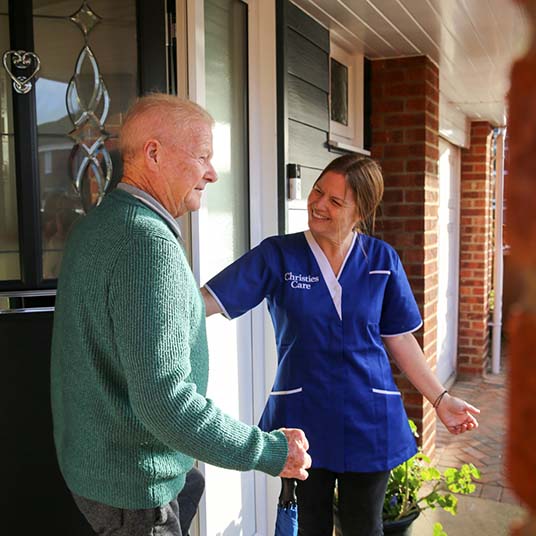Hourly Visiting Care
Providing you with hourly home care, as and when you need it.
- Carers available now
We’re there when you need us - from as little as one hour a week.
Sometimes you just need a little help now and then, or someone to call in and check how things are going. For this, our home care visit service is ideal.
We will arrange for a skilled carer to visit you and provide personalised care as little or as often as you need it. Whether it’s an ongoing arrangement or simply needed for a set period of time, we can be as flexible as you need us to be.
- After Stroke
- Physical Injury
- Dementia
- Learning Disabilities
- End of Life
- Multiple Sclerosis
- Parkinsons
- Convalescent
- Cerebral Palsy
- Domicillary
Our Hourly Visiting Care carers support you to live independently
We provide a full range of care services to enable you to continue to live independently in your own home, including:
Helping you
with your life
- Pet care including dog walking
- Helping with your social life
- Helping to arrange and attend medical appointments
- Helping with physio exercises etc
- Companionship; being there without taking over
Housekeeping
and cooking
- Housekeeping and cleaning
- Laundry and bed-making
- Meal planning and cooking
- Shopping
- Running errands
Personal care
- Helping with dressing and undressing
- Hairstyling
- Washing, showering and bathing
- Helping with other small tasks that happen to occur
- Administering medication and controlled drugs
- Hoisting and using complex lifting equipment
Expert Hourly Care available in your town and surrounding area
We arrange personalised hourly visiting care visits with you, not around you
In today’s busy world it’s not always practical or possible for a family member to provide the help they’d like to give. Our Hourly Home Care can fill that gap, giving you confidence and peace of mind that your loved one’s needs are being met.
By having a carer come in to support them with those everyday tasks that may have become too difficult for whatever reason, they retain their independence and can carry on their normal lives without interruption or the extra cost associated with having a live-in carer.
- Personal care and hygiene
- Housekeeping and home hygiene
- Managing mobility, medication and appointments





Why choose Christies Care?
We are consistently rated Outstanding by CQC
The best selected and trained carers
We get it. We’ve used our carers to look after our parents
More than 95% of our clients come to us through recommendation
FAQ
Home care is care that you receive in your own home on a live-in or hourly basis. Having home care promotes independence and means that you can stay in your own home, with the pets, garden, friends and live in familiar surroundings.
The role of a home carer is to give someone the help and support they need to be as independent as possible; to live as full a life as possible. A home carer visit on an hourly basis or live-in with you and will help with housekeeping, cooking, running errands, help with washing and dressing as well as other daily tasks to give the person being cared for the best possible life. The best home carers are people who really care about people, who understand what they really want and who work hard to help their clients to be happy.
Everyone is treated as an individual and next of kin are not liable for home care fees (or even care home fees). However, families may well find themselves contributing something towards the cost of care, either because they don’t meet the bar that allows the state to pay, or because they want better quality care than the state will provide, and so they top up at their own expense.
Home care is where an individual receives the car they need in their own home without the need to move. This can help to promote independence for the person receiving care. A care home is when someone has to move away from their own home, when there they receive the care they need to stay healthy.
The most common home care service is hourly visiting home care. If an individual needs a little bit of help, a carer comes in and gives them the help they need to carry on living an independent life. This hourly visiting home care can be from as little as an hour a week to several hours a day, entirely depending on the care receivers wants and needs. Live-in care is increasingly common, as people realise that even if you need full-time care, having a live-in carer means you can stay in your own home and you can avoid leaving your surroundings for a care home.
Home care can be seen as expensive because it depends on the carers who do a demanding yet rewarding job. In order to recruit and retain qualified carers, they must be paid enough. Paying carers too little is a false economy. For most care providers, carer wages (including travel and the on-costs of employment) make up 60-75% of revenue, with pay for the co-ordinators, trainers and others to keep the organisation going, taking up almost all of the rest.